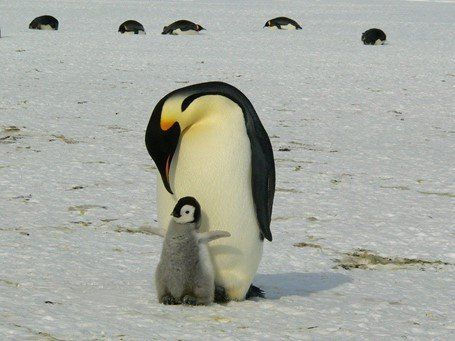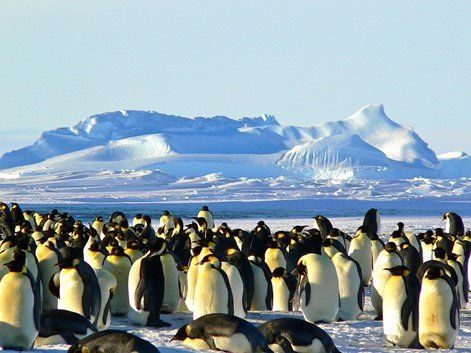A Penguin’s Worst Nightmare
Climate change is a direct and unavoidable threat to the planet and all of its inhabitants. For many animal species, the reality of climate change is a death sentence due to their inability to make large adaptations in a small window of time.
However, there is a general lack of research into the potential biological impacts of climate change, as many studies just focus on projection models. A group of researchers recognized the need to connect the biological information and the projection models for the purpose of proposing accurate conservation methods and understanding ecology. For this review study, they decided to use the emperor penguin ( Aptenodytes forsteri ) as an example of how this multidisciplinary research should be done.
Emperor penguins, along with other penguin species in Antarctica, are very vulnerable to climate change due to their reliance on sea ice. Emperor penguins are the largest known species of penguins standing at 1.2 meters tall. They were first identified as a distinct species in 1844. In the time since their discovery, there has been a lot of research done on the emperors and their life history patterns. This expanse of knowledge has allowed scientists to make population forecasts for the global population, something that has been done for very few species. It is because of this knowledge, and their vulnerability to climate change, that emperor penguins are a good example of how these multidisciplinary studies can work.
Emperor penguins are highly dependent upon Antarctic fast ice. Fast ice is sea ice that is anchored to land or some form of geological feature. Emperors form their colonies on and are completely dependent upon this fast ice for the entirety of their breeding period. They have a long breeding cycle, which lasts almost a full year. As the oceans continue to warm, ice formation is subject to change. Late-formation, early break up, or even failure of ice to form is one of the biggest threats to emperor penguins. Without fast ice for the entire duration of the breeding period, there is a high probability that breeding will be unsuccessful. Unsuccessful breeding hinders population growth and therefore ice loss directly threatens the future success of the species.
The authors of this article reported that in most climate models, sea ice area will decrease by 30-40% by the end of the century if we follow the projected trend of medium- high levels of greenhouse gas emissions. If this level of sea ice loss continues as projected, emperor penguins will not be able to breed successfully. This will spell disaster for the species. Although some colonies have been known to exist on land, the vast majority are based on sea ice. Overall, emperor penguins have not shown the ability to adapt to changing conditions in past studies, and it can be implied that if the ice does become unreliable, most colonies will be unsuccessful.
Another climate change related threat that emperors face is prey availability. When choosing the location of their colony, food availability is vital. Emperor penguins typically feed on fish, crustaceans, and squid. Because colonies are used as breeding grounds, these prey items need to be readily available within a certain radius of the colony so that adults and hatchlings can remain sufficiently fed. The winter sea ice that the penguins so heavily depend upon has also been shown to be a highly productive area making the water good for feeding. In contrast, pack ice (free floating sea ice) areas are not productive and food is not as readily available. This means that with the loss of fast ice, the food source will also shift. Decreasing sea ice in addition to other climate change impacts such as ocean acidification, decreasing salinity, and shifts in predation pressure will make the desired prey items less dependable.
Currently, there are believed to be 256,500 breeding pairs of emperor penguins with 54 identified colonies. Due to the imminent threat of climate change as we progress through the rest of the 21st century, this number is projected to drop. Some studies suggest a 50% decrease by the year 2100, while others indicate a 78% population decrease over the next three generations. Already, one known colony has moved, which is assumed to be due to reduced fast ice in the region. Due to these predictions and the changes already being seen, the authors proposed a re-evaluation of the emperor penguin population status. As of the last assessment in 2018, emperor penguins were listed as near threatened. Based on the information known about their behaviour and the climate models, the authors suggested that the emperors be reclassified as either vulnerable or threatened.
The only way to eradicate the environmental threats to the emperor penguins is to cut down on human caused greenhouse gas emissions. However, in the meantime, efforts should be made to protect their breeding habitats and feeding grounds. More research must be done on these penguins and on other species to better understand their vulnerability to climate change. Only once we fully understand the threats they face, can we make effective conservation decisions.
Trathan, P.N., et al. (2019). The emperor penguin- Vulnerable to projected rates of warming and sea ice loss. Biological Conservation. 241:1-11.
SHARE THIS ARTICLE















